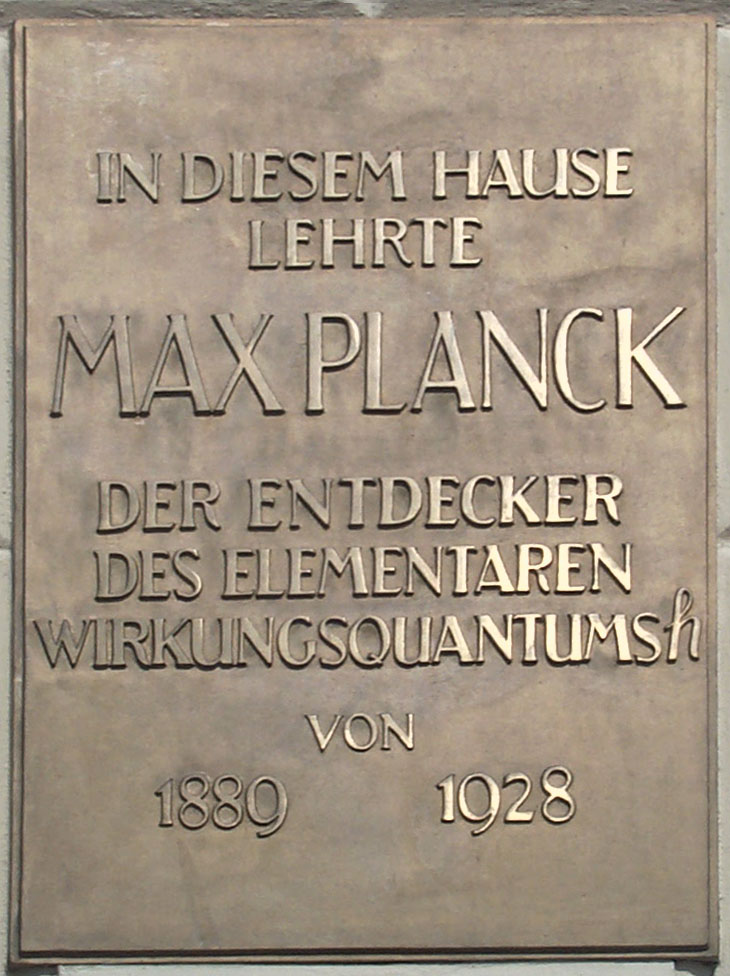|
Reduced Planck Constant
The Planck constant, or Planck's constant, denoted by h, is a fundamental physical constant of foundational importance in quantum mechanics: a photon's energy is equal to its frequency multiplied by the Planck constant, and the wavelength of a matter wave equals the Planck constant divided by the associated particle momentum. The constant was postulated by Max Planck in 1900 as a proportionality constant needed to explain experimental black-body radiation. Planck later referred to the constant as the "quantum of action". In 1905, Albert Einstein associated the "quantum" or minimal element of the energy to the electromagnetic wave itself. Max Planck received the 1918 Nobel Prize in Physics "in recognition of the services he rendered to the advancement of Physics by his discovery of energy quanta". In metrology, the Planck constant is used, together with other constants, to define the kilogram, the SI unit of mass. The SI units are defined in such a way that, when the Pla ... [...More Info...] [...Related Items...] OR: [Wikipedia] [Google] [Baidu] [Amazon] |
Joule
The joule ( , or ; symbol: J) is the unit of energy in the International System of Units (SI). In terms of SI base units, one joule corresponds to one kilogram- metre squared per second squared One joule is equal to the amount of work done when a force of one newton displaces a body through a distance of one metre in the direction of that force. It is also the energy dissipated as heat when an electric current of one ampere passes through a resistance of one ohm for one second. It is named after the English physicist James Prescott Joule (1818–1889). Definition According to the International Bureau of Weights and Measures the joule is defined as "the work done when the point of application of 1 MKS unit of force ewtonmoves a distance of 1 metre in the direction of the force." In terms of SI base units and in terms of SI derived units with special names, the joule is defined as One joule is also equivalent to any of the following: * The work required to ... [...More Info...] [...Related Items...] OR: [Wikipedia] [Google] [Baidu] [Amazon] |
Action (physics)
In physics, action is a scalar quantity that describes how the balance of kinetic versus potential energy of a physical system changes with trajectory. Action is significant because it is an input to the principle of stationary action, an approach to classical mechanics that is simpler for multiple objects. Action and the variational principle are used in Feynman's formulation of quantum mechanics and in general relativity. For systems with small values of action close to the Planck constant, quantum effects are significant. In the simple case of a single particle moving with a constant velocity (thereby undergoing uniform linear motion), the action is the momentum of the particle times the distance it moves, added up along its path; equivalently, action is the difference between the particle's kinetic energy and its potential energy, times the duration for which it has that amount of energy. More formally, action is a mathematical functional which takes the trajectory ( ... [...More Info...] [...Related Items...] OR: [Wikipedia] [Google] [Baidu] [Amazon] |
Wiens Law , an equation that describes the relationship between the temperature of an object and the peak wavelength or frequency of the emitted light
{{disambiguation ...
Wien's law or Wien law may refer to: * Wien approximation, an equation used to describe the short-wavelength (high frequency) spectrum of thermal radiation * Wien's displacement law In physics, Wien's displacement law states that the black-body radiation curve for different temperatures will peak at different wavelengths that are inversely proportional to the temperature. The shift of that peak is a direct consequence of ... [...More Info...] [...Related Items...] OR: [Wikipedia] [Google] [Baidu] [Amazon] |
Max Planck Wirkungsquantums 20050815
Max or MAX may refer to: Animals * Max (American dog) (1983–2013), at one time purported to be the world's oldest living dog * Max (British dog), the first pet dog to win the PDSA Order of Merit (animal equivalent of the OBE) * Max (gorilla) (1971–2004), a western lowland gorilla at the Johannesburg Zoo who was shot by a criminal in 1997 Brands and enterprises * Australian Max Beer * Max Hamburgers, a fast-food corporation * MAX Index, a Hungarian domestic government bond index * Max Fashion, an Indian clothing brand Computing * MAX (operating system), a Spanish-language Linux version * Max (software), a music programming language * MAX Machine * Multimedia Acceleration eXtensions, extensions for HP PA-RISC Films * ''Max'' (1994 film), a Canadian film by Charles Wilkinson * ''Max'' (2002 film), a film about Adolf Hitler * ''Max'' (2015 film), an American war drama film * ''Max'' (2024 film), an Indian Kannada language film by Vijay Karthikeyaa Games * '' Dancing St ... [...More Info...] [...Related Items...] OR: [Wikipedia] [Google] [Baidu] [Amazon] |
